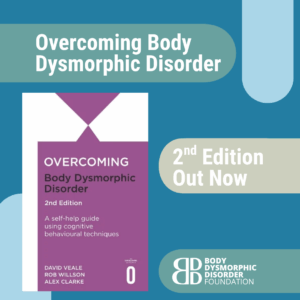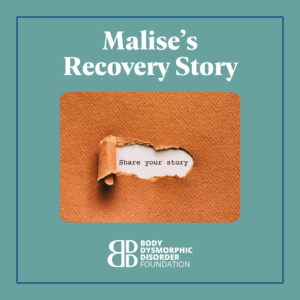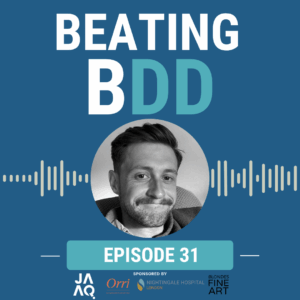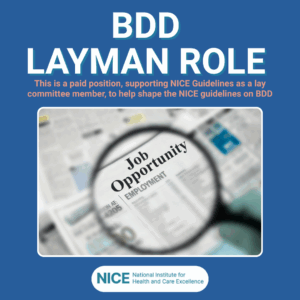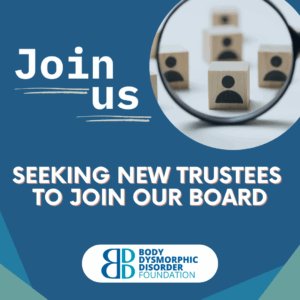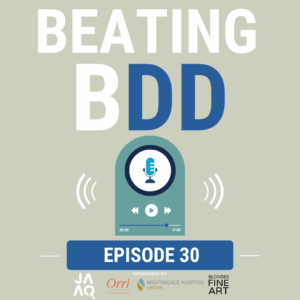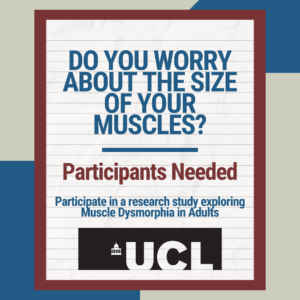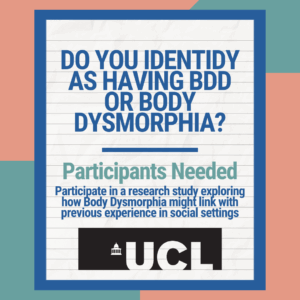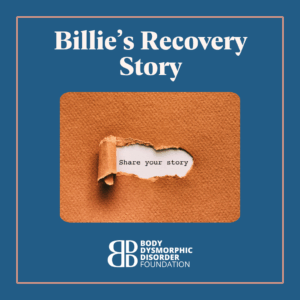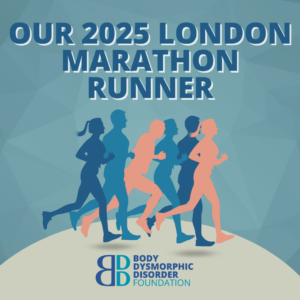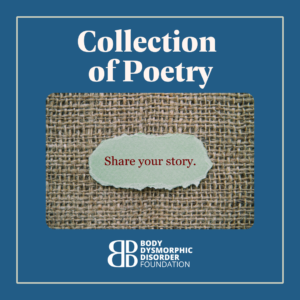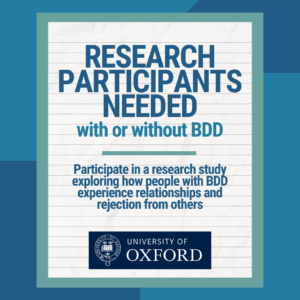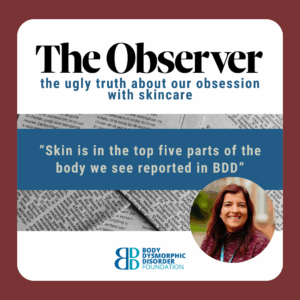I feel very positive about the fact that I can now recognise I had a disorder. In my mind that is the definitive sign that you are on the road to recovery, because then you can start to see and accept the outside world’s perspective.
My first memories of BDD symptoms are from when I was younger than 7 years’ old and at primary school. I had a fantasy that I would run again and again in my head that involved me playing in the playground at school and then suddenly dying. The other kids and the dinner-ladies would notice without being upset or bothered, as I was too ugly to care about. However, when they moved my body, the mask of ugliness that I had been secretly wearing all that time would slip off to reveal a pretty little girl underneath. At this point, the children and dinner ladies would become very upset and mourn my death, realising that all the time they had shunned me for being ugly, they had been wrong, and all the time I had been pretty underneath.
Other specific memories from that young age are rare, but the feeling that I was repulsive compared to the other children was always there. Playing kiss-chase with the other girls was never an option as it would put the poor boys in an embarrassing quandary where they were forced to either kiss some monster or humiliate me by not chasing me at all. I can remember being very young – I still had curly hair which I lost when I was 6 so I must’ve been 5 or less – and somebody in a shop commented to my mum that I had beautiful hair. I was eaten up with embarrassment and anger at the woman for saying something so obviously untrue and stupid. I couldn’t understand why she would be so cruel.
“I just knew that I was ‘very ugly’ and had horrid hair”
At that point my BDD was vague and undefined; I just knew that I was ‘very ugly’ and had horrid hair. Then, when I was about 11 years old, I started to get spots, and the BDD had something to really get hold of. By the time I was 14 I was spending an average of 4-5 hours getting ready to leave the house, with all my energy going into plastering on foundation and concealer and re-constructing my face as much as I could, using blusher and other makeup. I was getting though a concealer stick each week. If I heard anyone coming towards my bedroom during this process I would have to lock the door and pretend I was getting undressed to make them go away. I just couldn’t allow anyone, including family, to see me without full makeup, so it was always a stressful rush to get it all on before anyone caught me with a naked face!
People would make comments within earshot about wearing too much foundation, but I would much rather that than reveal the true horror of my face! High School was difficult, as my friends and I grew into young adults. They were all pretty, and would peer into mirrors to check their skin and have a moan about the odd black head. I would hang back; I couldn’t go anywhere near the mirror as I knew they would’ve been secretly watching me to see how I coped with looking at myself and my ugliness. In my head, my hideousness was recognised by all my friends but they were kind enough to never mention it, and to play along with the farce that I was normal. I could never figure out why they hung around with me, but I was fairly sure it was because they would look prettier to the boys if they stood next to me!
“Every waking moment and everything I did was shadowed by an intense self-consciousness and awareness of my looks.”
Of course, it was a different story with mirrors when I got home. I had one in my bedroom that I spent most of my time in front of, putting on makeup, staring unbelievingly at my gargoyle features, crying, asking why me, hitting and scratching and clawing at my face for hours on end. The only day of the year I looked forward to was Halloween, when I could wear a mask and blend in with the other people, and experience for one night what it was like to be normal. Every waking moment and everything I did was shadowed by an intense self-consciousness and awareness of my looks. I was so repulsive that I wanted to hide away forever, and not put others in the embarrassing position of having to look at me. I felt sorry for anyone that came into contact with me. When I was out I had an overwhelming urge to walk up to passers-by and apologise for my face, and let them know that I was fully aware of what I looked like but there was nothing I could do. I wanted to beg them to forgive me for being so ugly. Every fibre of my body just yearned to disappear.
The only thing I can liken it to is being forced to walk down a street and go about your business completely naked, feeling vulnerable and exposed and knowing that it is unacceptable and wrong for you to be naked, that everyone is staring at you but is too shocked or polite to say anything. So there is this overriding belief in every social interaction that the person you are speaking to knows you are naked and they know that you know they know, and they are horribly embarrassed about it and so are you, but neither one of you is going to mention it. The worst thing was that it could never be talked about. In my head, everyone knew how hideous I was, but it was never mentioned and I could certainly never bring it up as I was so excruciatingly embarrassed by the whole situation. Unfortunately in the ‘real’ world, this meant nobody would’ve known the reasons I was behaving oddly. I avoided leaving my bedroom, as it was the only place where I didn’t feel like I was about to explode with the stress of it all.
During my later teenage years the darkness of night and the dim lights of nightclubs provided a certain amount of disguise, where I thought my skin and layers of makeup were less obvious. So I was able to participate in a basic social life with my friends, especially as getting drunk dampened the feelings of self-hate a little bit. I would know, down to the last minute, what time it got dark during the summer, and only then would I leave my bedroom. It meant missing out on all the summer day activities and early-evening fun, but there was absolutely no choice. I would start getting ready at about 5pm, but still not be ready by the time the pubs were closing at 11. My friends grew increasingly annoyed with my lack of reliability. It wasn’t just a case of not ‘being ready’ to go out – it was more a case of not having done a good-enough job to conceal the terrible secret that was my face. There was no way I could leave the house and let people find out the true extent of my grotesqueness. That would mean disaster.
Obviously I didn’t have boyfriends. Now and again I would drunkenly snog someone in a club, but I knew they were only doing it because they were drunk and that they would wake up the next day ashamed, with their mates taking the piss out of them. Now and again someone would say they fancied me, and my world would spin with anger at their cruelty. I wanted to push them up against a wall and scream in their face that I knew what I was, I wasn’t stupid, and that I knew they were taking the piss out of me, and how could they be so spiteful? All of this was accompanied by the huge amount of other neuroses that you would expect someone under great psychological and emotional strain to display. The OCD symptoms, general anxieties, phobias, depression, self-harm and thoughts of suicide all kept my BDD great company.
But there is hope, and good news. I am now 30 years old, and have considered myself ‘recovered’ for about 5 years. I only realised there was something to ‘recover from’ at the age of 22, when I stumbled across Katharine Phillips’ book The Broken Mirror, in the course of my psychology degree. If I had been as ill as I was during the rougher years, I think I could have read that book from cover to cover and never realised that it was describing something I might have, so convinced was I that I looked like a 100% genuine freak.
“I still fail to comprehend that someone might fancy me or fall in love with me”
BDD caused me to drop out of my A-Levels (in the end I couldn’t face leaving the house). It cost me a ‘normal’ childhood and adolescence, and left me with a persistent underlying suspicion of anyone who compliments me or wants to hang out with me. I still fail to comprehend that someone might fancy me or fall in love with me, but I hope this will change as time goes by, and at least I can be rational about these things now, and recognise that it’s probably the BDD whispering doubts in my ear, rather than the way things really are. Life is liveable and I can function. I can look at myself in a mirror with other people present. and I can walk down the street without wanting to apologise. I feel very positive about the fact that I can now recognise I had a disorder. In my mind that is the definitive sign that you are on the road to recovery, because then you can start to see and accept the outside world’s perspective. Things get a lot easier from that point onwards!
More stories from the community

